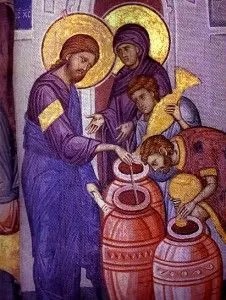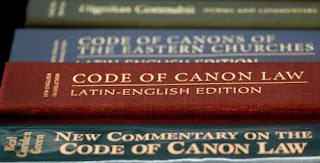There is a difference between saying/writing "In defense of celibacy" v. "In defense of
mandated celibacy."
Defenders should really state what they are essentially defending: The obligatory character of priestly celibacy that has existed in the Latin Church since the 12th Century.
If one were to re-title any books, articles, talks and blogs called "In Defense of Celibacy," many if not most would need to be re-titled, "In Defense of Mandated Celibacy."
Married Priests Not an Attack on Celibacy
Advocates of married priests -- or rather advocates for the greater increase of married priests in the Latin rite by opening up the priesthood once again to baptized cradle Catholics -- are not seeking to reform celibacy as celibacy. Celibacy has existed since the beginning of the Church. Rather, advocates of married priests are reforming the current mandated celibacy or obligatory celibacy requirement. Nowhere does the Church officially teach in her 2,000 year history that celibacy is "essential" or "ontological" to the priesthood.
There may be some link to the priesthood, but that is the closest case one can make. Otherwise, there would be no married men in the priesthood. And there are married men in the priesthood. God and His Church has allowed it. The love (agape) of the Heart of Christ is the essence of the priesthood (not celibacy). Celibacy is one way to live the love (agape) of the Heart of the Christ in the priesthood.
And while there is an indelible character conferred upon ordination, indelibility does not mean celibacy is required. Celibacy is not essential to sacred ordination. As the revered Fathers of the Second Vatican Council taught, celibacy is "not demanded by the very nature of the priesthood, as is apparent from the practice of the early Church" (PO 16).
One Pathway Forward
The reform in the current canonical language of the Latin Church can be done by way of dispensation. This is the current evolution of the Church's legislation of the mandated character of celibacy. For instance, dispensations from Canon 1047 could allow a Viri Probati pathway to ordain married men in the Latin Rite priesthood.
Cardinal Gracias of India, a canon lawyer, highlighted that married men can be canonically dispensed from the Latin celibacy requirement.
Cardinal Czerny of the Holy See acknowledged that decisions toward opening the priesthood to married men can be made by Church authority.
Cardinal Schönborn of Austria, general editor of the Catechism, proposed to select married priests from the ranks of married deacons.
Other cardinals, regional bishops conferences and individual bishops have called for married priests, especially since the Second Vatican Council.
There may be other pathways forward. Dispensation is just one way as the Church is currently constituted, given the rows and rows of hedges placed around enforcing mandated celibacy since the 12th Century. In a sense, defenders of mandated celibacy are making a mere canonical defense of mandated celibacy. In a sense, they are being good canon lawyers, but the theology of the Church has allowed married priests as an authentic part of the Catholic Church.
While Catechism 1579 states that men are "normally" chosen "with the exception of permanent deacons" from among men who live a celibate life to the Latin priesthood, this is addressable so that it respects both the Catechism and Canon Law. That is actually the current modern norm. It is the current norm because since the 12th Century, it evolved to its current norm. Married priests was not the exception to the rule as we see today. The ancient norm prior to the 12th Century was noncontinent married priests existing alongside celibate priests.

As Cardinal Jimeno said during the 2019 Amazon Synod, at no time was celibacy called into question. Celibacy is in the Scriptures and in the early Church, but *mandated* celibacy is neither in Scripture/Tradition nor in the early Church. In fact, again, married priests working together with celibate priests was the "norm". The revival or restoration of married priests in the Latin Church is not an attack on celibacy but a return to the ancient tradition of the Church. And if one loves tradition and seeks to restore it, then one must love the ancient tradition of married Catholic priests.
Thus, let's call the position of the defenders of priestly celibacy what it really is: A defense of the canonical, 12th Century mandated practice. It is only 812 years old when it was in absolute legal force before the modern Popes (starting with Pius XII) allowed married priests to return to the Latin Rite.
Celibacy for the Sake of the Kingdom is Not Just for Priests
As advocates of a greater role for married priests in the Latin Church, we defend celibacy, too, and are for celibacy. It is one of the beautiful ways one can serve God's Kingdom. Many people, those who are not priests (Catechism 922 & Catechism 1618ff), have given all for the sake of the Kingdom of God. "Esteem of virginity for the sake of the kingdom and the Christian understanding of marriage are inseparable, and they reinforce each other" (Catechism 1620). Mt. 19:12 isn't just for Catholic priests the way defenders of mandated celibacy make their case to be. Our Lord and St. Paul did not mandate celibacy for the priesthood.
So let's be crystal clear then: When defenders say that they are for celibacy, they are really saying, in essence, that they are for defending mandated celibacy for the priesthood.
There is a big difference between saying/writing "In defense of celibacy" v. "In defense of mandated celibacy" or "I defend celibacy" versus "I defend mandated celibacy." Defenders should really state what they are essentially defending: The obligatory character of priestly celibacy that has existed in the Latin Church since the 12th Century.
Get ready for some major re-titling.





.jpg)